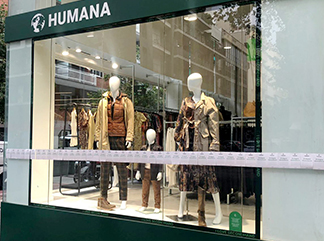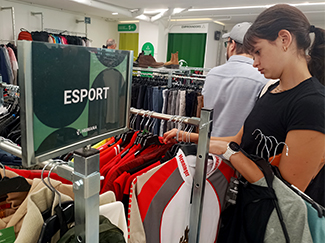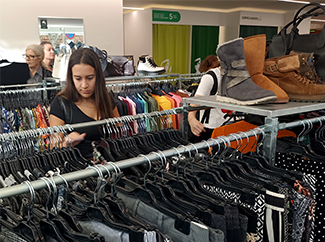consent_cookie
Duración: 1 year
Stores the user's cookie consent state
27-08-2025
The second-hand fashion offering is growing in Barcelona with a new specialised store. Humana is opening a new store on Friday, 29 August, at 67 Numancia Street. Located in the Les Corts neighbourhood, it is the organisation's 23rd store in the Catalan capital, and it's 55th in Spain.
The new second-hand fashion store has 300 m2 of retail space (it is Humana's second largest in Barcelona after the one at 12 Portaferrissa Street) in a two-storey building and offers 7,500 items that have been previously selected at the organisation's textile reuse preparation plant in l'Ametlla del Vallès (Barcelona).
"Thirty-two years ago, we opened our longest-running second-hand fashion store, which is still open today, at number 9 Carrer Roger de Llúria. Two years ago, we opened our most iconic store on Carrer de la Portaferrissa, and today we are opening a new store in the Les Corts neighbourhood,‘ explains Rubén González, Store Strategy Manager at Humana, who adds: ’We are very happy to contribute to increasing the availability of this type of fashion in Barcelona, a city that has witnessed how the second-hand clothing sector and its social perception have changed."
‘For years, prejudices and barriers regarding second-hand fashion have been overcome. It was a sector with little prestige and has become an attractive alternative for an increasingly wider audience, a sustainable and affordable option that allows people to define their own identity away from fast fashion brands,’ continues González.
‘Family’ and ‘Vintage’ stores
Humana shops have traditionally sold all kinds of reused clothing, without distinction. For the past five years, the organisation has differentiated its offering into ‘Family Shops’ (17 establishments in Barcelona) and ‘Vintage Shops’ (6 establishments). The new point of sale on Calle Numancia belongs to the ‘Family’ category.
The items for sale come from donations deposited in green containers located on public roads or at the shops' own collection points. The recovered clothing is sorted at the Ametlla del Vallès plant before being sent to the organisation's establishments. The funds generated are used to promote development cooperation projects in southern countries and social actions in Spain. In 2024, €2.7 million was allocated to cooperation projects, mainly in less developed countries.
Furthermore, the reuse of clothing contributes to the reduction of polluting emissions, as for every kg of clothing recovered that does not end up in a landfill, the emission of 6.1 kg of CO2 is avoided.
Humana figures for 2024 and concerns in the sector
Humana stores in Barcelona sold 3.1 million items of clothing and had 1.2 million buyers in 2024. ‘Despite these positive figures, the sector is currently experiencing a period of concern: clothing is becoming less durable and of lower quality, which reduces its reuse value and increases the proportion of non-reusable post-consumer textiles,’ explains Rafael Mas, the organisation's Director of Projects and External Relations. ‘Reuse rates have fallen in recent years, weighed down by the poor quality of clothing and the rise of ultra-fast fashion, whose items are so cheap that they generate almost no value on the second-hand market,’ he adds.
Rejuvenation of the public
The profile of the average Humana store customer is someone with a high degree of loyalty, interested in sustainable fashion and who appreciates the added value of the social purpose of used clothing. Beyond these data, the organisation highlights a key factor in the sector: the rejuvenation of the public. ‘Until 2020, the under-25 segment accounted for 10% of our consumers; today, it has doubled to 20%,’ says Rubén González. ‘They have less purchasing power and at the same time are committed to minimising their impact on consumption,’ he continues.
Second-hand fashion in Catalonia: a study that examines the sector
Spain has around 800 second-hand fashion stores, half of which are concentrated in the hands of five social economy entities. Half of the second-hand clothing supply is concentrated in three autonomous communities (Catalonia, Andalusia and the Community of Madrid), while the cities with the most stores are Madrid, Barcelona, Valencia and Seville. This is according to a report that analyses the sector using data from 2024.
The study quantifies the number of second-hand fashion establishments in Catalonia at 150: it is the autonomous community with the most outlets selling reused clothing, ahead of Andalusia (123) and the Community of Madrid (106).


